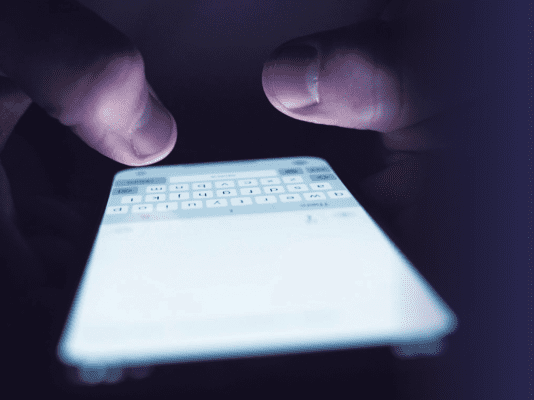Several years ago, The New Yorker published their weekly magazine with what can only be described as a damning photo. On the magazine’s 90th anniversary cover (one of nine), the issue depicted a man holding a phone in what’s become a sadly ubiquitous posture. Ignoring a cloudy sky and the flight of a butterfly directly overhead, this man, with his thumbs at the ready, is “bent in on himself,” staring at his little “glowing rectangle.”
If you spend any amount of time in public spaces these days, you observe this scene with unremitting frequency. In the grocery line, at traffic lights, even sitting across the table from a friend, the glow of our smartphones has pulled our attention downward and inward. More visibly than ever, we are creatures, as Augustine and Luther long ago described us, “deeply curved in” on ourselves. The iPhone, and all its representative progeny, could not be more appropriately named.
The formative power of habit
One of the genius design features of the modern smartphone is that it places its user at its gravitational center. All smartphone activity revolves around the person holding it, creating a subconscious bodily ritual or liturgy, as Justin Earley argues in The Common Rule. What this means for us is that as long as we hold a phone in our hands, we function as the acting center of our universe. To put it more bluntly, our world becomes self-centered.
We would likely all agree that our collective forward-hunched posture, the constant peering into the screens of our smartphones, is a habit we’ve let get out of hand. What we may not be aware of, however, is the formative power of this habit and its encroachment into all other areas of our lives. To that point, Earley argues that our habits, whether we’re aware of it or not, actively “form our hearts.” So, if habits, as he suggests, possess the power to shape us deep down at the heart-level, and one of our most frequent habits involves this inward bend toward a phone—and toward the self—we must ask: what sort of person is this habit forming us to be?
Habits and distorted discipleship
Our smartphones have more power over us than we’re willing to reckon with. We have sold our souls to these all-powerful devices in exchange for the very real conveniences they promise. And, in so doing, we’re reaping the consequences. No corner of our lives is left unaffected by our ritualized devotion to our phones, namely the three “corners” most consequential: knowledge of God, knowledge of self, and love of neighbor. In effect, this yielding to our phones has disrupted and disordered these most fundamental competencies of the Christian faith.
- Knowledge of God
John Calvin, in his Institutes of the Christian Religion, says that “wisdom consists almost entirely of two parts: the knowledge of God and of ourselves.” In modern life, as we have turned inward, we have deprived ourselves of this wisdom that Calvin speaks of. Being “deeply curved in” means not just that we’ve neglected our pursuit of God and the knowledge of God, but that we’ve convinced ourselves—thanks, in part, to this bodily liturgy—that his existence is inconsequential.
Being self-centered is a statement of theological belief with real-life consequences; it is an act of enthronement, a declaration of the assumed supremacy of the all-powerful “me.” This ritual that we daily participate in, if we lack prudence and vigilance, is actively forming us wayward from the God who made us. Our constant phone-ward gaze is a visual representation of just how absurd self-centered living looks.
- Knowledge of self
Without the understanding that “our very being is nothing else than subsistence in God alone,” as Calvin says, then our ritualized, self-centered habits will only perpetuate a deeper and more rigid commitment to our own perceived self-importance and self-sufficiency. Bending inward upon oneself does not beget a greater knowledge of oneself. Rather, it welcomes the whispers of our foe (Gen. 3:5) and seeks to reign independently rather than in submission to our Maker.
When we view citizens as digital avatars instead of people, or when we engage with fiery rhetoric instead of gentle Christlikeness, we can be sure that we’re acting as disciples of our smartphone rather than disciples of our Savior.
As a result, our knowledge of self is not just reprioritized, but it is impoverished. The self is given a faux supremacy while simultaneously being stripped of its true vocation; we become a shell of who we were created to be. We are not meant to assume the role of God over our lives, but this is precisely what we attempt when we maintain this contorted posture.
- Love of neighbor
When we live our lives with the glow of our phones constantly upon our face, we are being formed for Christian malpractice. No longer is Jesus’ second greatest commandment concerned with the love of neighbor; we mistakenly prioritize ourselves. As it relates to our civic engagement, our political philosophy takes an identical inward turn. With the individual acting as the gravitational center of his or her political concern, the love of neighbor becomes a secondary consideration when we participate in this American rite. When we view citizens as digital avatars instead of people, or when we engage with fiery rhetoric instead of gentle Christlikeness, we can be sure that we’re acting as disciples of our smartphone rather than disciples of our Savior.
Habits and Christian discipleship
Since that fateful day when the garden-intruder convinced Eve that she and Adam should rule in the place of God, we have been grasping for God’s throne. Subtly, and subconsciously, our growing dependence on our smartphones is often a manifestation of this grasping for authority and autonomy. And it is forming us into a people with an impoverished knowledge of God, an over-torqued knowledge of self, and a misapprehension of the second greatest commandment. It is inhibiting us being conformed to the image of Christ. This doesn’t mean that the smartphone is an evil device that we should shun, though. But it does mean that it’s a powerful device that we should respect. What are we to do, then?
The very act of peering down and in toward a phone is a powerful act of discipleship, developing scores of navel-gazing persons. To combat this, the church needs new habits. Though it may seem trite and simple, the most effective habit in this fight for Christian formation may just be divorcing ourselves from our phones more frequently. Cultivating a growing knowledge of God and self, and an increasing faithfulness to loving our neighbor, requires that we dethrone our devices from their seat of supremacy. It requires that we vacate that seat ourselves.
To know God, we must develop the habit of lifting our eyes from our smartphones and gazing upon his beauty. To know ourselves, we must develop the habit of lifting our eyes from our smartphones and hearing from the God who speaks to us through his Word. And to love our neighbor, we must develop the habit of lifting our eyes from our smartphones and assuming not the contorted posture of our digital age but the cruciform posture of Jesus.










